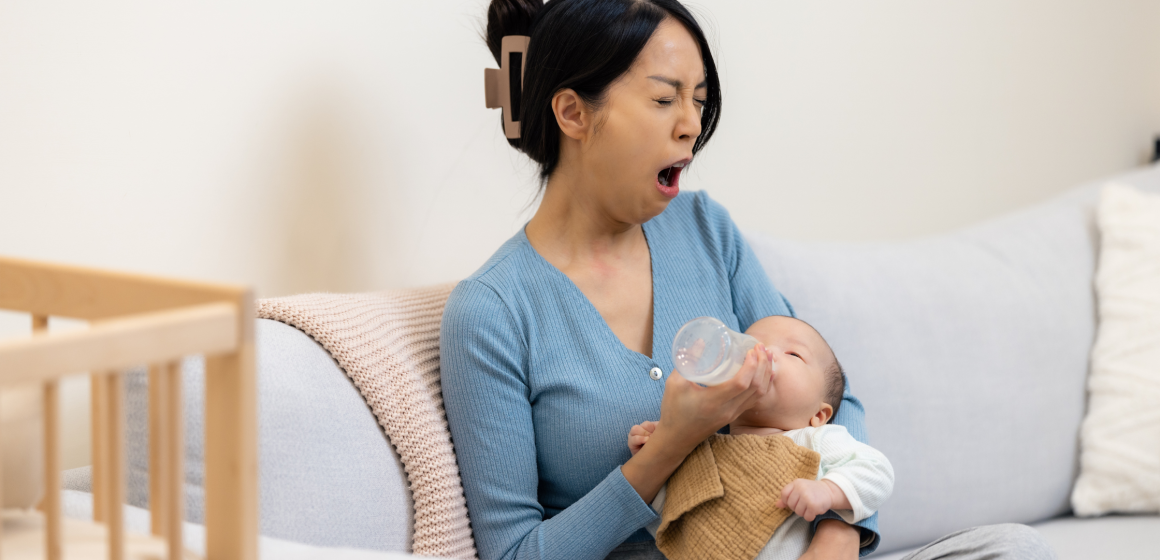Bringing home a newborn is one of life’s greatest joys, but it also comes with sleepless nights, early mornings, and a level of fatigue many new parents aren’t prepared for. Sleep deprivation is a nearly universal experience in the first months of parenting. While it’s a normal part of adjusting to a newborn’s needs, it can take a toll on physical health, emotional well-being, and family relationships.
The American Academy of Pediatrics (AAP) stresses that supporting parents’ health—especially sleep—is critical for overall family wellness. Understanding what’s normal, how to cope, and when to ask for help can make the newborn stage more manageable.
Why Sleep Deprivation Happens
Newborns sleep a lot—often 16 to 18 hours per day—but in short bursts of 2 to 3 hours at a time. Because babies wake frequently to feed, parents rarely get long stretches of rest. This fragmented sleep pattern, combined with the stress of adjusting to new routines, can leave parents feeling constantly tired.
The Effects of Sleep Deprivation
Short-term sleep loss leads to irritability, poor concentration, and difficulty making decisions. Over time, chronic sleep deprivation may increase the risk of depression, anxiety, and even physical health problems such as high blood pressure. Parents often describe feeling “foggy” or unable to enjoy daily moments.
Coping Strategies for Parents
While nothing eliminates sleep deprivation entirely, practical strategies can help:
- Sleep when the baby sleeps: Even short naps during the day can restore energy.
- Share nighttime duties: Alternate feedings, diaper changes, or soothing shifts with a partner or trusted caregiver.
- Limit nonessential tasks: Accept that housework may wait—rest is more important.
- Practice good sleep hygiene: Create a calming bedtime routine, avoid screens before bed, and keep the room dark and quiet.
- Accept help: Family and friends can provide meals, babysitting, or household support, freeing parents to rest.
Emotional Wellness and Sleep
Exhaustion can blur the line between “normal tiredness” and something more serious. The AAP notes that sleep deprivation can worsen symptoms of postpartum depression or anxiety. If feelings of sadness, hopelessness, or constant worry accompany fatigue, it’s important to seek help from a healthcare provider.
When to Seek Medical Advice
Parents should contact their doctor if they experience:
- Inability to sleep even when the baby is resting.
- Persistent mood changes, anxiety, or panic attacks.
- Thoughts of harming themselves or the baby.
- Extreme fatigue interfering with basic daily tasks.
Your pediatrician may also ask about parental well-being during well-baby visits, since parental health directly affects child health.
Support in Buffalo and Erie County
Families in Western New York don’t have to manage sleep deprivation alone. Resources include local parent support groups, postpartum doulas, and pediatricians at Medical Health Associates of WNY, who can provide guidance, referrals, and reassurance during this transition.
The Bottom Line
Sleep deprivation is part of new parenthood, but it doesn’t have to overwhelm you. By prioritizing rest when possible, sharing responsibilities, and seeking help when needed, parents can protect their health and better enjoy the early months of their baby’s life.
For more resources, visit the AAP’s parenting wellness page. To find local support, connect with Medical Health Associates of WNY, where pediatricians care for children while supporting the parents who nurture them.
Because caring for your baby means caring for yourself, too—and sleep is a big part of that equation.












